Construction
How AI Negotiation Agents Improve Construction Procurement [And Why Do You Need It]
September 22, 2025 • 113 Views • 30 min read
Tetiana Stoyko
CTO & Co-Founder
Construction procurement has entered a new era where Contract Negotiation Artificial Intelligence (CNAI) transforms traditional practices of construction procurement. Modern AI negotiation tools can streamline many processes, such as data updates, price research, and finding reliable contractors.
According to Gartner, by 2027, 50% of organizations will utilize AI-driven supply negotiations. The reason? Such innovations allow specialists to focus on deals with the clients, make more data-driven decisions, perform faster estimations, and offer more personalized services.
Traditionally, the construction industry relied on manual processes, where the key role was played by human labor and expertise. However, the latest news shows that leveraging AI can help automate many operations in this field, reducing the workload and expenses on repetitive tasks.
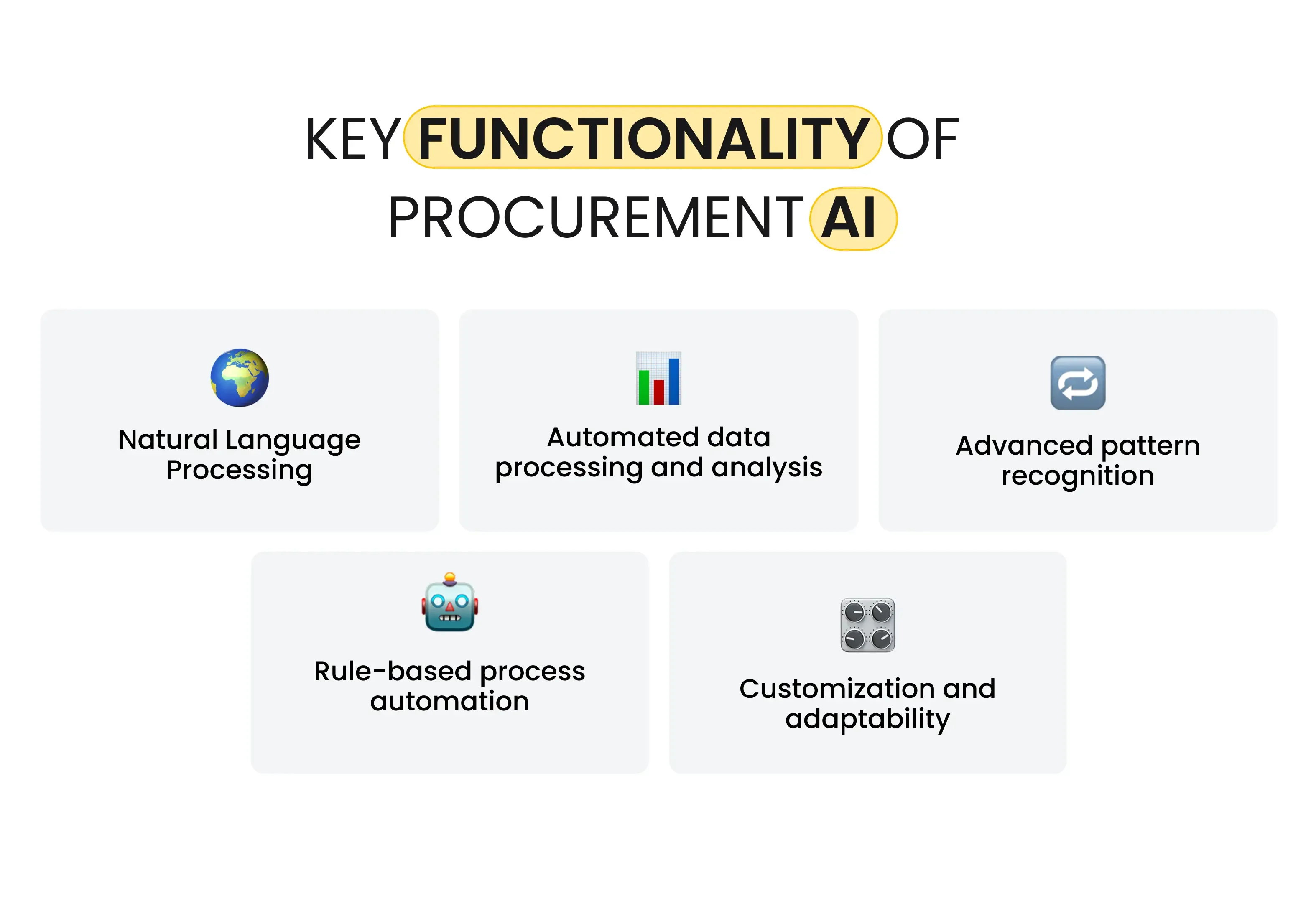
AI negotiation agents show a fundamental shift from reactive to proactive procurement management. They offer construction companies ways to achieve much higher efficiency and accuracy in sourcing materials, services, and equipment.
Such software tools can improve procurement in the construction field thanks to a few core features of any modern AI model:
- Natural Language Processing (NLP) enables them to understand almost any request and generate a corresponding human-like response.
- Data processing and analysis capacities show much higher results than any human, regardless of their experience and expertise.
- Pattern recognition helps these solutions to define even the most complex and obscure correlations between different facts or factors.
- Rule-based process automation helps to teach AI how to behave in different cases or how to perform various tasks independently. It also offers incredible flexibility and personalization of virtual assistants, allowing users to define how AI should behave.
AI agent negotiation solutions can process vast amounts of data to identify optimal pricing strategies, evaluate supplier performance, and recommend negotiation approaches that maximize value while minimizing risk. As a result, businesses deal with faster procurement cycles, reduced costs, improved supplier relationships, and enhanced project outcomes across the construction lifecycle.
Key Tasks of an AI Negotiation Agent in Procurement
Contract negotiation AI agents function as full-fledged intermediaries that automate and optimize the complex interactions between construction companies and their suppliers.
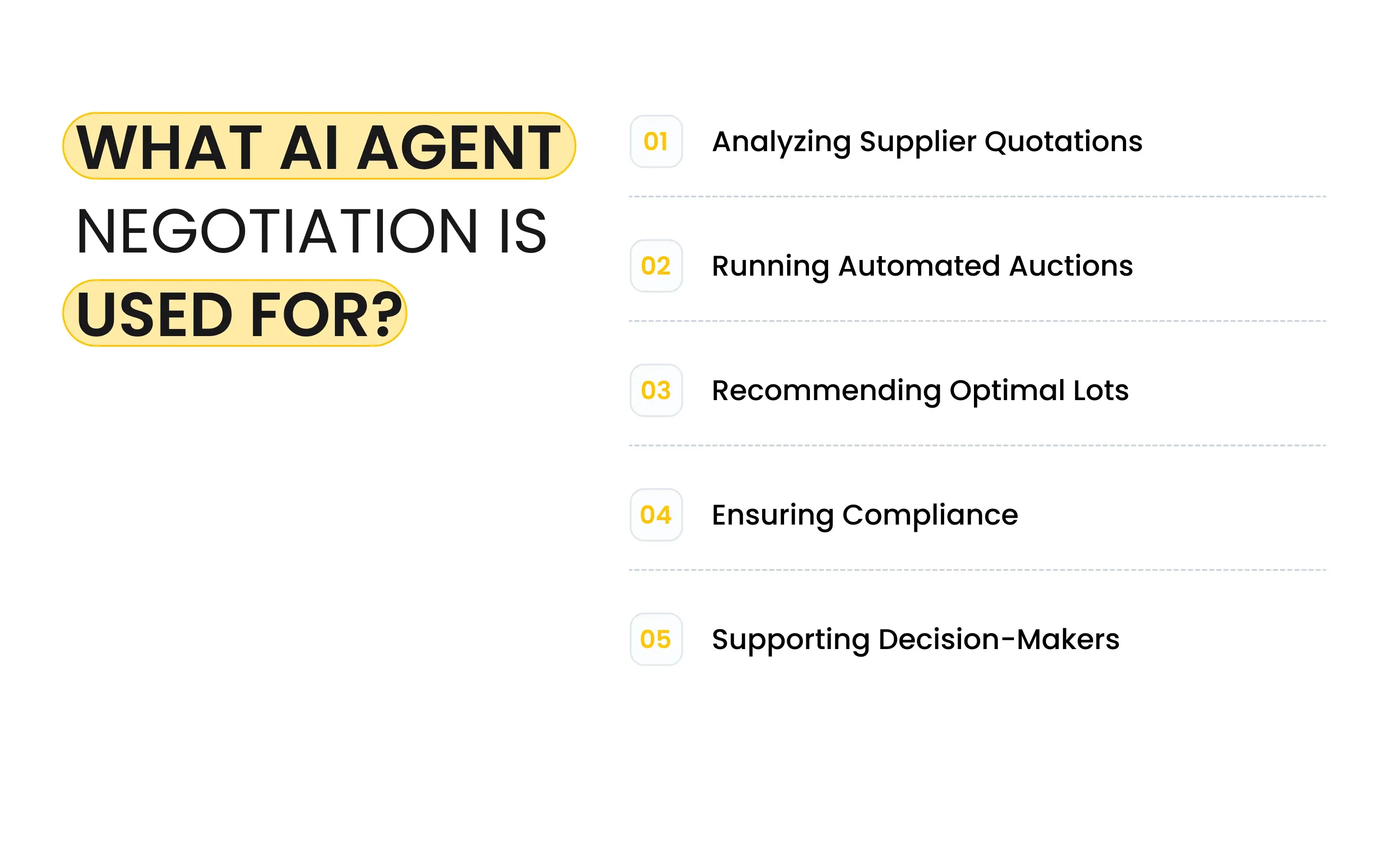
Traditional procurement methods rely heavily on manual evaluation and human judgment. At the same time, AI solutions process thousands of supplier interactions, analyze market conditions in real-time, and execute negotiations. And all of these actions are based on predefined parameters, while the software is learning from each transaction to improve future performance and accuracy.
Frankly, contact negotiation is just one of multiple AI business automation services. For instance, numerous companies have already streamlined many repetitive operations, such as customer support services or algorithm-driven content recommendations. However, creating AI agent negotiation solutions requires more expertise and skills than the features mentioned above.
The reason for such complexity is simple and lies in the core functionality of such software solutions. Despite sharing the key features with generative AI systems, intelligent negotiation agents are much more autonomous.
These systems integrate with existing Enterprise Resource Planning (ERP) platforms, supplier databases, and project management tools. This helps to define and learn procurement needs and opportunities.
By automating routine tasks and providing intelligent recommendations for complex decisions, AI contract negotiation agents enable procurement teams to focus on strategic initiatives while ensuring operational efficiency and compliance with organizational policies. Therefore, the key responsibilities for such virtual assistants include:
- Analyzing Supplier Quotations
- Running Automated Auctions
- Recommending Optimal Lots
- Ensuring Compliance
- Supporting Decision-Makers
Analyzing Supplier Quotations
Such autonomous solutions revolutionize the quotation analysis process.
Mainly, they automatically parse and evaluate multiple supplier bids, being able to react to any real-time updates, and showing excellent accuracy and speed. Thanks to advanced algorithms, these systems can extract key information from quotations almost immediately.
Usually, such data includes pricing structures, delivery timelines, quality specifications, and contract terms. Yet, it is possible to adjust them by asking for additional data if needed.
Cutting-edge data management is another feature of contract negotiation AI. Thanks to flexibility and personalization, your analysts can achieve a much higher level of transparency and accuracy during procurement.
For instance, apart from simply finding the best deal, you can utilize such agentic artificial intelligence to perform a constant comparative analysis. So, the system will automatically evaluate quotations against historical pricing data, market benchmarks, and project-specific requirements.
This intelligent evaluation includes risk assessment, quality scoring, and delivery reliability analysis, enabling procurement teams to make informed decisions based on total value rather than lowest price alone.
Running Automated Auctions
Although it is possible to train a Procurement AI to participate in auctions autonomously, we recommend a supervised approach. To be more specific, you can gain a competitive advantage by benefiting from fast and accurate data analysis.
The AI will monitor bidding patterns, identify strategic opportunities for extensions or modifications, and provide your procurement team with suggestions and the latest updates. Such virtual assistants can simultaneously coordinate multiple auction events and manage bidding cycles autonomously, significantly reducing the workload of the team.
Recommending Optimal Lots
These systems evaluate numerous scenarios and factors, considering supplier capacity, geographical proximity, historical performance, and project-specific requirements. This helps to define and recommend optimal vendor combinations that balance cost, quality, delivery schedules, and risk factors.
AI in construction procurement offers a variety of ways to find the optimal lots. Thanks to such scenario evaluation, they can suggest more complex and obscure approaches, such as lot splitting strategies, if this maximizes competition while ensuring adequate supplier diversity and backup options.
Ensuring Compliance
Another great way to use Procurement AI agents is to ensure compliance and alignment with regulatory requirements, corporate policies, and legal standards.
These systems can maintain comprehensive databases of applicable regulations, including local building codes, safety standards, environmental requirements, and procurement legislation. As a result, construction companies can scale much faster, benefiting from global markets and compliance with international laws.
However, even if you don’t plan to go global, you still can profit from AI-driven compliance monitoring. For instance, these technologies can compare the latest versions of local laws with your activities to prevent potential mistakes. Additionally, they can notify your company if any regulations, directly or indirectly related to your business, are about to change.
AI agents can also flag contracts that lack essential compliance elements and recommend specific clauses or modifications to secure adherence to applicable standards, ensuring that all suppliers meet the necessary qualifications for construction projects.
Supporting Decision-Makers
Long story short, even the simplest AI negotiation solutions provide your procurement managers with better data, crucial for efficient and accurate decision-making. This data can include intelligent insights, comprehensive risk analysis, supplier scoring matrices, and strategic recommendations for complex negotiations.
However, the agentic artificial intelligence can also upscale and automate many repetitive tasks, constantly running and processing different assigned tasks. And the best thing is that such autonomy requires very little human supervision.
As a result, the system generates detailed reports that combine quantitative analysis with qualitative assessments. At the same time, decision-makers must oversee the reports and understand the full implications of different procurement options.
Finally, AI agents can simulate various negotiation strategies, assess market timing impacts, and recommend optimal approaches for specific supplier relationships, based on the results of such simulations.
How AI Enhances Procurement Negotiation
Unprecedented speed, precision, and consistency in complex supplier interactions are the core reasons to consider AI integration in your procurement operations.
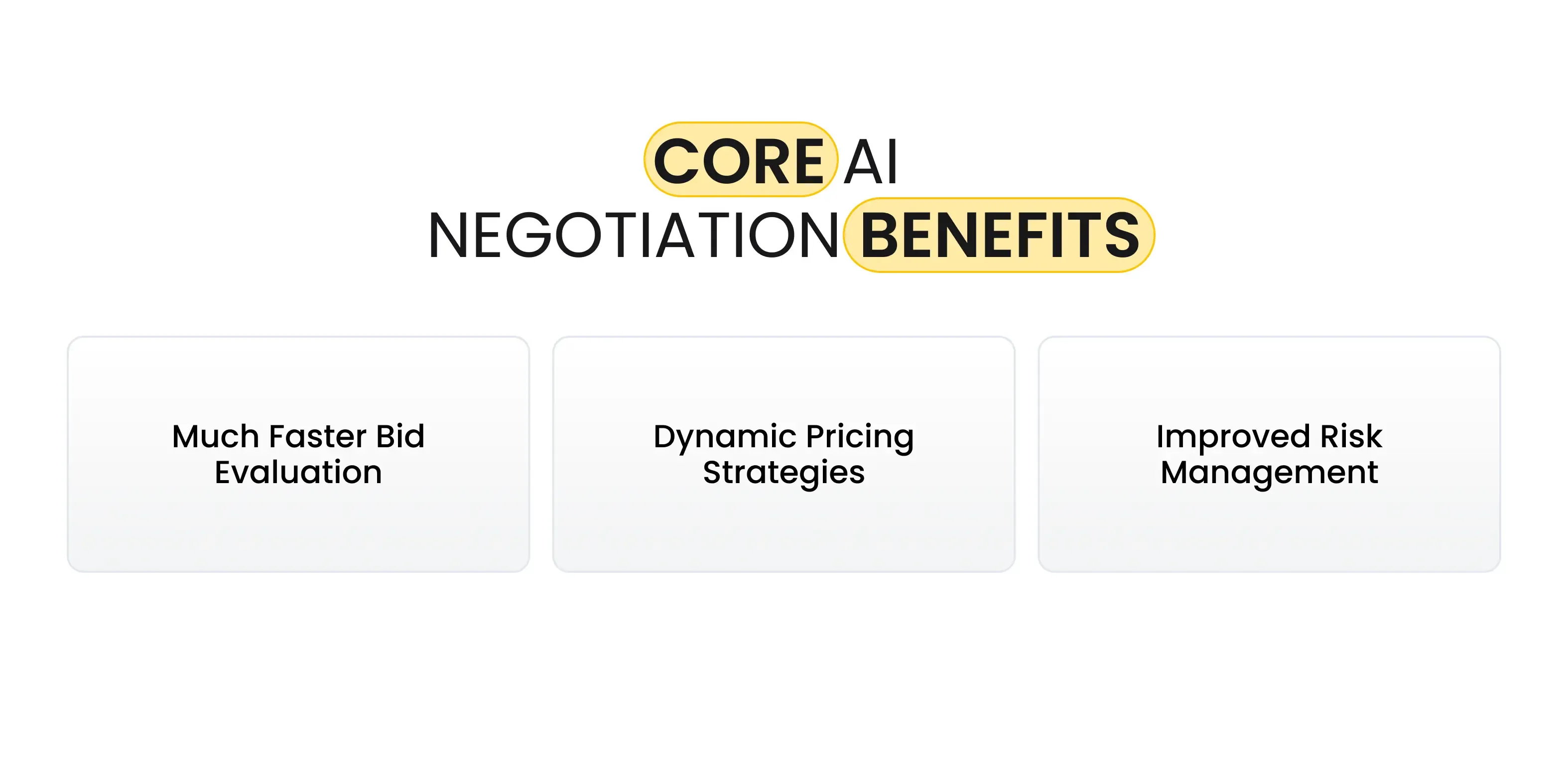
The strategic value of AI in procurement negotiation extends beyond operational efficiency. It encompasses improved supplier relationships, better market intelligence, and enhanced competitive positioning.
Thanks to the ability to cover multiple processes at once, AI systems identify trends and opportunities that human negotiators might miss. This allows construction companies to develop more sophisticated negotiation strategies while maintaining the flexibility to adapt to changing market conditions and project requirements.
More practical and specific examples of AI negotiation benefits include:
- Faster bid evaluation
- Dynamic pricing strategies
- Improved risk management
For a better illustration, let’s consider some of the real-life examples of how construction companies already utilize AI-powered solutions for procurement.
Real-World Applications in Construction Procurement
Parspec: AI-Powered Procurement Platform
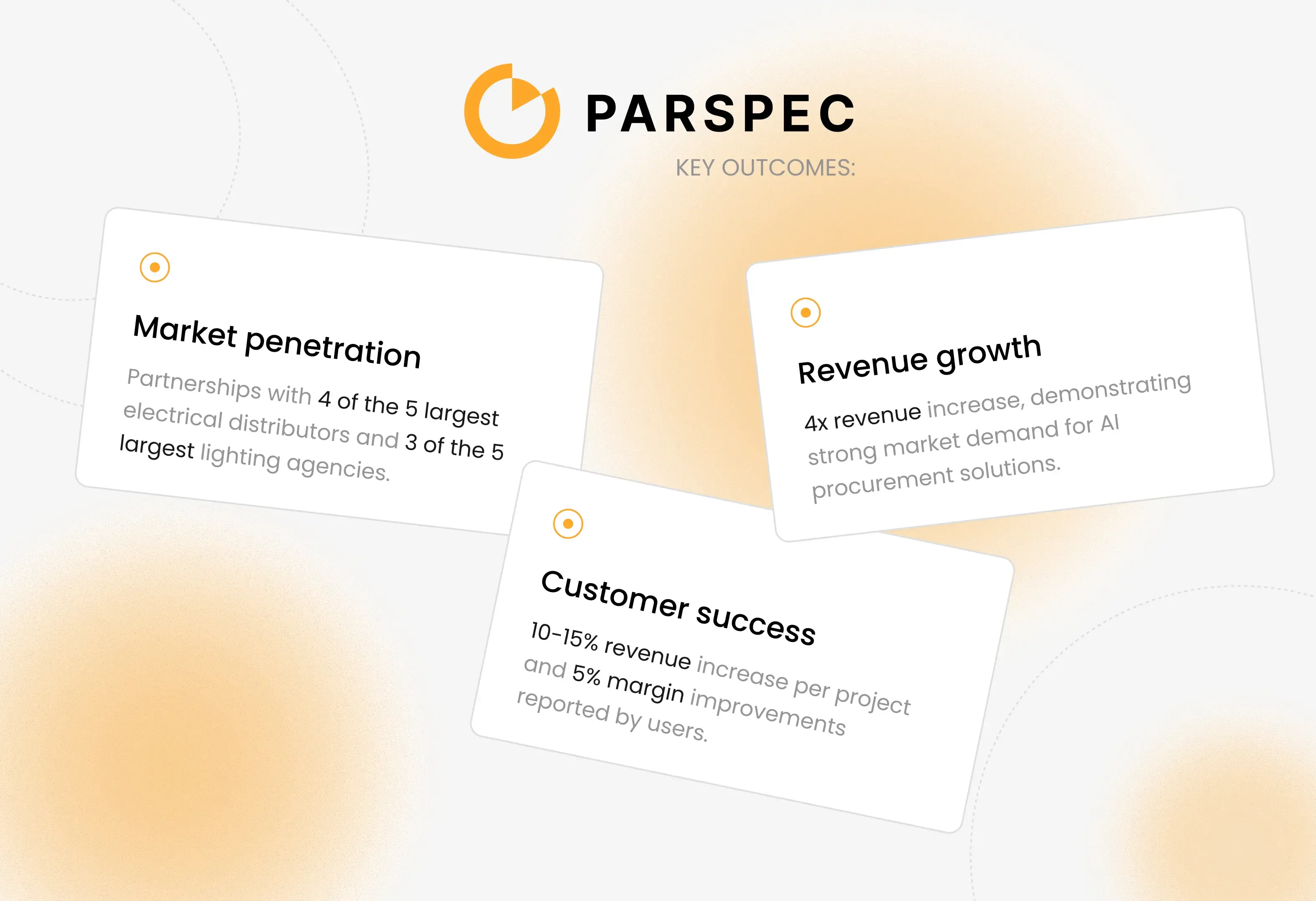
Parspec has emerged as the leading AI-driven construction procurement platform, securing $20 million in Series A funding in 2024. The main goal behind this project is to transform how construction products are bid and supplied across Mechanical, Electrical, and Plumbing (MEP) verticals.
This AI negotiation pipeline can process over 4,000 manufacturer websites daily, using machine learning and large language model applications to extract products from unstructured documents. The system identifies technical requirements from specifications and automatically matches products to them. This enables distributors to bid on more projects with greater accuracy and speed.
The company has achieved remarkable growth metrics, including 4x revenue growth over 12 months while maintaining high customer satisfaction rates. Customers report achieving 10-15% increases in revenue per project and 5% improvements in project margins through the platform's automated procurement capabilities.
Key outcomes to note:
- Market penetration: Partnerships with 4 of the 5 largest electrical distributors and 3 of the 5 largest lighting agencies.
- Revenue growth: 4x revenue increase, demonstrating strong market demand for AI procurement solutions.
- Customer success: 10-15% revenue increase per project and 5% margin improvements reported by users.
Emoldino AI-Powered Supplier Negotiation
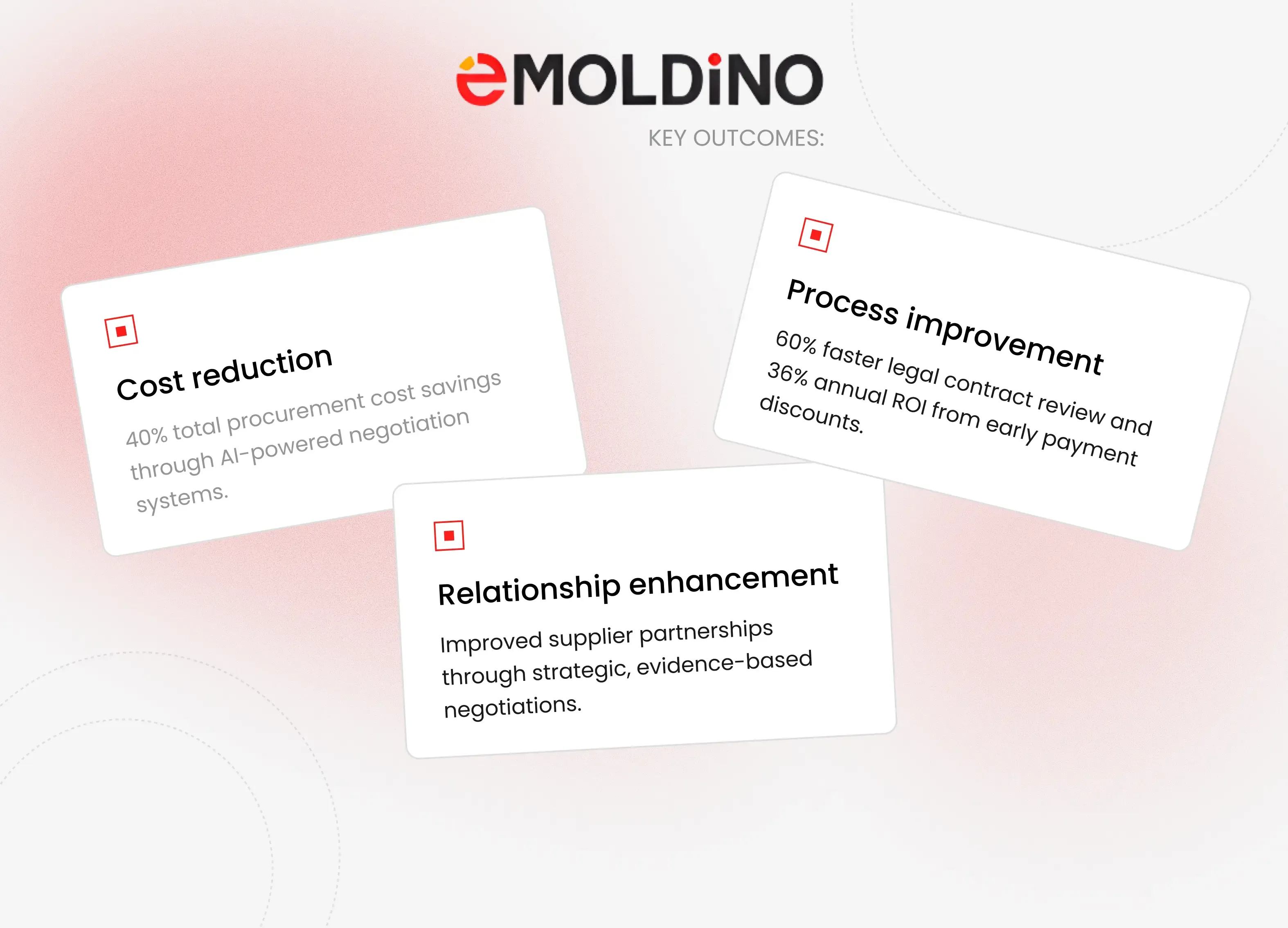
Emoldino, a Korean technology manufacturing company, achieved a documented 40% reduction in procurement costs through the comprehensive implementation of AI-powered supplier negotiation systems.
The company transformed its operations by deploying contract negotiation AI with NLP abilities, predictive analytics for supplier behavior analysis, and automated negotiation systems across the entire supplier ecosystem.
As a result, integrated contract intelligence technology automatically analyzes thousands of supplier agreements, reducing legal review time by 60% while identifying potential risks and optimization opportunities. Built-in predictive analytics tools forecast supplier performance and market conditions, enabling proactive negotiation strategies. At the same time, AI-driven dynamic pricing analysis provides real-time market intelligence that gives negotiation teams significant advantages in supplier discussions.
The astonishing 40% cost savings breakdown included: 15% from early payment discounts identified and captured through AI automation, 20% from reduced overpricing through AI-powered benchmarking against market rates, and 5% from predictive risk scoring that eliminated costs associated with unreliable suppliers.
The implementation demonstrates that AI negotiation systems can achieve substantial cost reductions. On top of that, they are actually improving supplier relationships through more strategic, data-driven interactions.
Key outcomes to note:
- Cost reduction: 40% total procurement cost savings through AI-powered negotiation systems
- Process improvement: 60% faster legal contract review and 36% annual ROI from early payment discounts
- Relationship enhancement: Improved supplier partnerships through strategic, evidence-based negotiations
Zepth AI-Enhanced Tender Tracker
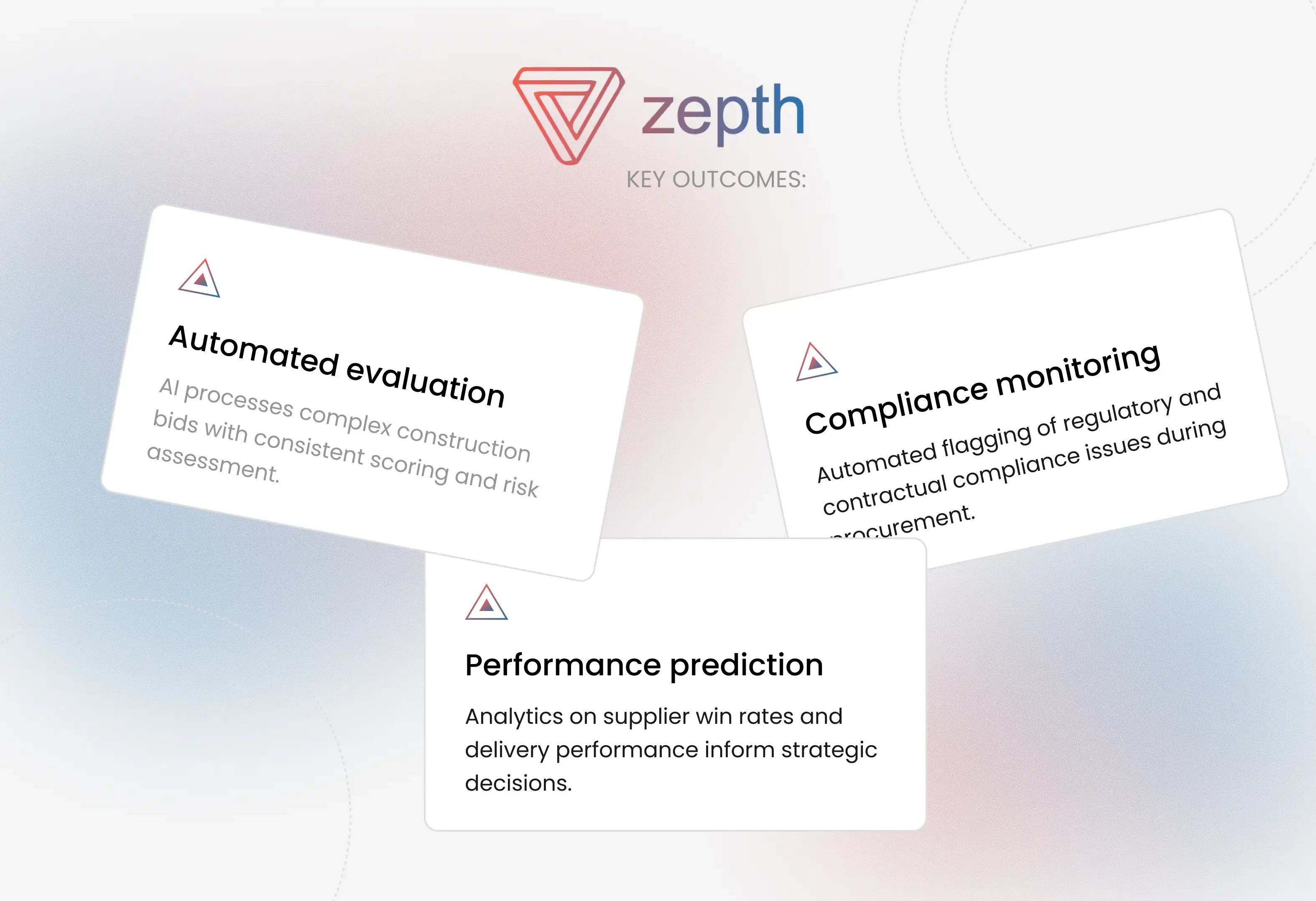
Zepth's AI-powered tender tracker changes the construction procurement process by automating bid review and evaluation systems. They dramatically improve procurement efficiency and decision-making accuracy.
The platform utilizes procurement AI to extract, compare, and assess construction bids against predefined or customizable scoring rubrics. This implementation significantly reduces manual workload and minimizes subjective judgments in the procurement process.
The key features of this solution include:
- Side-by-side bid comparisons that simplify decision-making,
- Automated flagging of compliance or risk issues to enhance oversight,
- Predictive analytics on vendor performance and win rates for informed supplier selection.
Apart from it, AI includes intelligent analysis of technical specifications, delivery schedules, and risk factors.
As a result, automated evaluation processes allow procurement teams to handle larger bid volumes while still maintaining consistency and accuracy in supplier selection. The system's ability to identify potential compliance issues and predict vendor performance based on historical data provides construction firms with strategic advantages in competitive procurement environments.
Key outcomes:
- Automated evaluation: AI processes complex construction bids with consistent scoring and risk assessment
- Compliance monitoring: Automated flagging of regulatory and contractual compliance issues during procurement
- Performance prediction: Analytics on supplier win rates and delivery performance inform strategic decisions
How to Implement AI Negotiation in Your Procurement
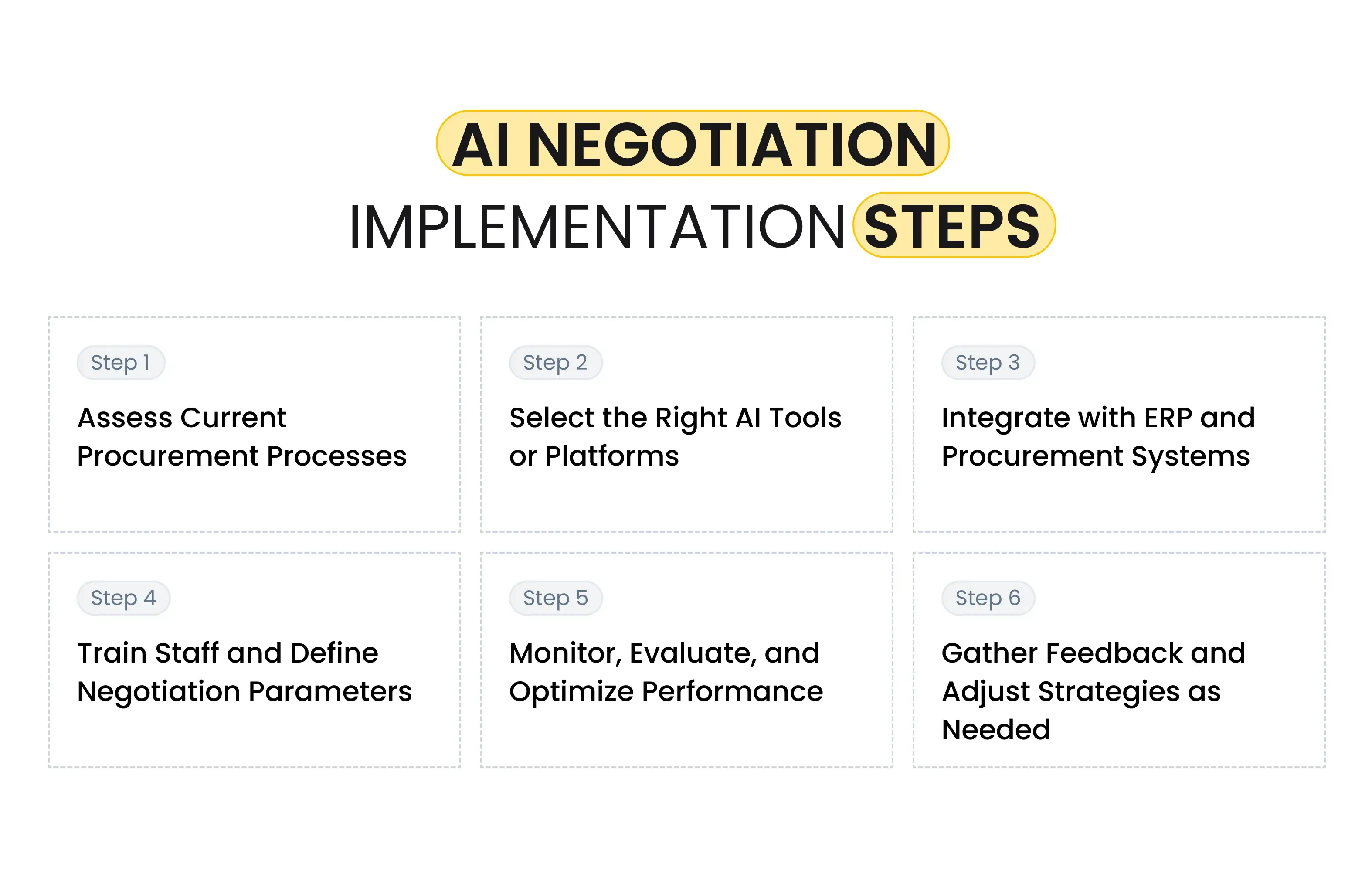
Knowing the benefits of the AI agent negotiation, you might wonder what its implementation looks like and how much it costs. Let’s break down the whole process into the core factors to consider:
- Assess Current Procurement Processes
- Select the Right AI Tools or Platforms
- Integrate with ERP and Procurement Systems
- Train Staff and Define Negotiation Parameters
- Monitor, Evaluate, and Optimize Performance
If you hesitate with any of these steps, you can always rely on construction IT services from reliable vendors like Incora. We will gladly guide and advise you on any aspects related to your future project!
Assess Current Procurement Processes
Only when you have a clear understanding of your needs, as well as a view on how to achieve your goals, can you proceed to the next steps. Otherwise, you risk investing in the wrong project. Thus, your first step in any software development or integration project should start with an assessment.
The foundation of successful implementation of AI in construction procurement is not an exception and begins with a comprehensive evaluation of existing business workflows. You must identify bottlenecks, inefficiencies, and automation opportunities. Simply put, you should understand what and why you want to improve, using artificial intelligence.
This assessment should examine every aspect of the procurement lifecycle. You should gather as much information as possible, from supplier identification and Request For Quotation (RFQ) development to contract negotiation and performance monitoring.
Additionally, don’t forget to analyze your procurement data quality, system integration capabilities, and preparation for technological change. Identify specific pain points such as lengthy bid evaluation processes, inconsistent negotiation outcomes, supplier relationship management challenges, or compliance monitoring difficulties.
Taking into account the foregoing facts during the assessment will help you to choose the most suitable AI negotiation solutions that will serve your needs. Moreover, this approach enables your team to prioritize features worth automating, gradually streamlining functionality, helping to save time and resources for development.
Select the Right AI Tools or Platforms
Finding proper AI negotiation tools requires not only learning about available SaaS solutions, but also considering whether they can be integrated into your central software system.
Evaluate ready-made platforms, which provide specialized procurement automation, or comprehensive solutions like SAP Ariba with AI enhancements. Alternatively, find a dedicated software development company to discuss a custom development project.
After comparing the pros and cons of each approach, you can make a more balanced decision on which AI contract negotiation solution to invest in.
You need information on the vendor support quality, implementation timelines, training requirements, and total cost of ownership. Note: it includes not just expenses for development or integration, but also licensing and ongoing maintenance costs.
Judging from our experience, investing in custom solutions is a much more comprehensive and cost-efficient approach from a long-term perspective. Such projects address all of your needs and require fewer resources for maintenance.
Integrate with ERP and Procurement Systems
One of the core requirements for a successful AI implementation is seamless integration and data sharing. Otherwise, the software might lack efficiency or even functionality if it depends on real-time data updates.
So, apart from finding a proper AI solution, you must ensure that your management systems support such technologies. Also, consider API requirements, data formatting standards, and security protocols necessary for effective system connectivity.
Another piece of advice is to thoroughly test integration functionality using representative data sets and typical procurement scenarios to identify potential issues before full deployment.
Train Staff and Define Negotiation Parameters
Apart from implementing new software solutions, ensure that they are user-friendly. To fully utilize the potential of contract negotiation AI solutions, your team needs to understand the system's pros and cons, its features, and how to use them effectively.
The best way to ensure such awareness is to ask your tech partners for supplemental documentation or other specified learning materials in various formats, such as video, audio, wiki, etc. If you are considering adopting a ready-made solution, ask your vendors if they have such materials and provide them with the solution.
Focus on helping procurement professionals understand how to interpret AI recommendations, override automated decisions when necessary, and leverage AI insights to improve negotiation outcomes.
AI negotiation agents are precise and complex solutions. Thus, you have to pay attention and define clear negotiation parameters and decision-making authority levels. They must specify when AI agents can operate autonomously and when human intervention is required.
Establish approval workflows for different transaction types, cost thresholds, and risk levels to ensure appropriate oversight while maximizing automation benefits. Create monitoring procedures that track AI performance, decision quality, and user satisfaction to identify opportunities for system refinement and additional training. Ask your employees to document best practices and lessons for further knowledge sharing.
Monitor, Evaluate, and Optimize Performance
Finally, AI integration is not the end. After successful implementation, you should set up monitoring, evaluation, and optimization practices.
These activities are essential, even in cases where you are using SaaS AI agents. Regular performance reviews should assess both quantitative metrics and qualitative factors such as supplier relationships and negotiation quality. Therefore, if something goes wrong or AI can’t meet your KPIs, you can identify the issue immediately and take corrective action.
Eventually, AI technologies will continue to develop. This IT field constantly scales, offering numerous new features and services. Thus, pay attention to the weakness of your business and AI solution to plan future updates and enhancements that incorporate new capabilities.
Why Incora Software Is the Best Candidate for AI in Construction Procurement
Incora Software represents the optimal solution for construction companies seeking to implement AI-powered procurement negotiation systems. We have proven expertise in construction industry software, as well as AI development and integration services.
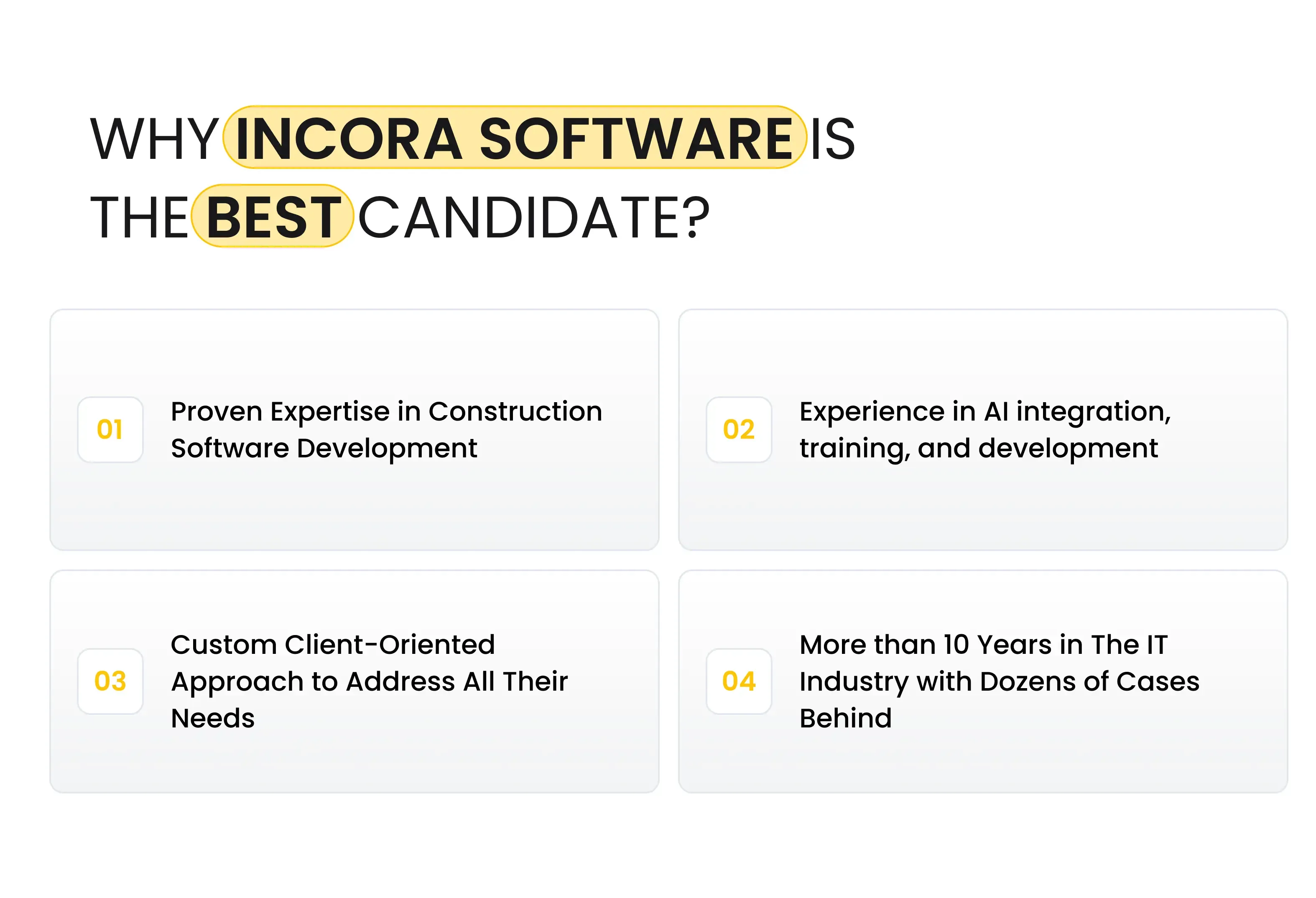
Thanks to our experience with construction management systems, automated workflows, and ERP integrations, we can ensure successful deployment within any construction technology environment.
Our client-focused approach helps to define all your needs and goals, creating the most tailored and efficient software, capable of satisfying all of your requirements.
Ready to revolutionize your construction procurement with AI negotiation agents? Contact us today to schedule a consultation. We will gladly listen to your ideas and suggest how our specialized AI solutions can help embody them.
What’s your impression after reading this?
Love it!
23
Valuable
20
Exciting
5
Unsatisfied
1
FAQ
Let us address your doubts and clarify key points from the article for better understanding.
What is an AI negotiation agent in construction procurement?
An AI negotiation agent in construction procurement is a digital system that uses artificial intelligence to automate and support contract negotiations. It analyzes data, predicts outcomes, and suggests optimal strategies, helping buyers and suppliers reach agreements faster, reduce costs, improve transparency, and minimize disputes in complex procurement processes.
How does AI improve procurement in the construction industry?
AI improves procurement in the construction industry by automating supplier selection, analyzing historical and market data, predicting risks, and optimizing costs. It enhances transparency, speeds up decision-making, and reduces human error. By offering data-driven insights, AI strengthens contract management, supplier relationships, and overall efficiency in procurement processes.
Why do construction companies need AI negotiation agents?
Construction companies need AI negotiation agents to handle complex contracts, reduce costs, and save time. These agents streamline procurement by analyzing data, forecasting risks, and suggesting fair terms. They also minimize disputes, enhance transparency, and support better decision-making, allowing companies to focus on project delivery and efficiency.
Are AI negotiation agents secure for procurement processes?
Yes, AI negotiation agents are secure for procurement processes when built with robust safeguards. They use encryption, access controls, and compliance frameworks to protect sensitive data. By reducing manual handling, they also lower human error and fraud risks, ensuring confidentiality, integrity, and trust throughout procurement negotiations.
YOU MAY ALSO LIKE
Management Systems
Construction Project Management Software for Small Business: Complete Guide
Construction,
Real Estate
How Construction Workflow Management Software Helps to Reduce Costs and Boost Efficiency?
Construction
How Integrated BOQ Software Bridges the Gap Between Construction Departments
Construction
How to Create a Procore Alternative Software for a Construction Business
Construction
How to Deal With Weaknesses of Construction Financial Management Software?
Real Estate
How to Select the Right Construction Management Software for Your Business
Construction
Investing in the Right Construction Reporting Software: Features That Make a Difference
Construction
Is Voice Technology Worth the Investment for Construction Firms?
Construction
Overcoming Integration Challenges: Making Construction Data Work Together with BI Tools
Management Systems
Simple Construction Software for Construction Planning: Case Study
Let’s talk!
This site uses cookies to improve your user experience. Read our Privacy Policy
Accept
Share this article